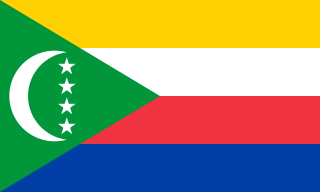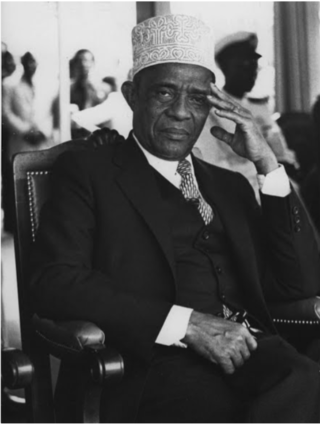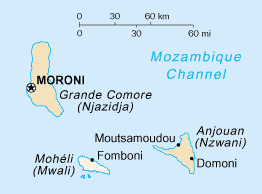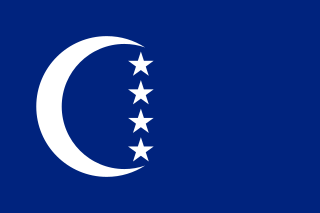Related Research Articles

The Comoros, officially the Union of the Comoros, is an archipelagic country made up of three islands in Southeastern Africa, located at the northern end of the Mozambique Channel in the Indian Ocean. Its capital and largest city is Moroni. The religion of the majority of the population, and the official state religion, is Sunni Islam. Comoros proclaimed its independence from France on 6 July 1975. A member of the Arab League, it is the only country in the Arab world which is entirely in the Southern Hemisphere. It is a member state of the African Union, the Organisation internationale de la Francophonie, the Organisation of Islamic Co-operation, and the Indian Ocean Commission. The country has three official languages: Shikomori, French and Arabic.

Ahmed Abdallah Abderemane was a top Comorian politician. He was a member of the French Senate from 1959 to 1973, and President of the Comoros from 25 October 1978 until his assassination in 1989.

Mohéli, also known as Mwali, is an autonomously-governed island that forms part of the Union of the Comoros. It is the smallest of the three major islands in the country. It is located in the Indian Ocean off the coast of Africa and it is the smallest of the four major Comoro Islands. Its capital and largest city is Fomboni.

Grande Comore is an island in Comoros off the coast of Africa. It is the largest island in the Comoros nation. Most of its population is of the Comorian ethnic group. Its population as of 2006 is about 316,600. The island's capital is Moroni, which is also the national capital. The island is made up of two shield volcanoes, with Mount Karthala being the country's highest point at 2,361 m (7,746 ft) above sea level. According to the 2009 revision of the constitution of 2002, it is governed by an elected Governor, as are the other islands, with the federal government being much reduced in power. The name Ngazidja is sometimes seen in the now nonstandard form Njazidja.

Capital punishment in Singapore is a legal penalty. Executions in Singapore are carried out by long drop hanging, and usually take place at dawn. Thirty-three offences—including murder, drug trafficking, terrorism, use of firearms and kidnapping—warrant the death penalty under Singapore law.
Capital punishment in Saudi Arabia is a legal punishment, with most executions in the country being carried out by decapitation (beheading) – Saudi Arabia being the only country in the world to still use the method. In 2022, recorded executions in Saudi Arabia reached 196, the highest number recorded in the country for any year over the last three decades.
Capital punishment in Georgia was completely abolished on 1 May 2000 when the country signed Protocol 6 to the ECHR. Later Georgia also adopted the Second Optional Protocol to the ICCPR. Capital punishment was replaced with life imprisonment.
The postage stamps and postal history of the Comoro Islands is an overview of the postage stamps and postal history of the Comoro Islands, an Indian Ocean archipelago located on the south-east side of Africa.
Health in the Comoros continues to face public health problems characteristic of developing countries. After Comoros's independence in 1975, the French withdrew their medical teams, leaving the three islands' already rudimentary health care system in a state of severe crisis. French assistance was eventually resumed, and other nations also contributed medical assistance to the young republic.
Capital punishment is a legal criminal penalty in Somalia, a nation in East Africa. Legally sanctioned executions of the death penalty in Somalia are carried out by shooting, in accordance with the 1962 Somali Penal Code and the Military Penal Code. Sharia and Islamic tribunals are recognised in Somalia in parallel with the civil law: these would have the authority to order execution by other means, such as beheading and stoning. Since at least the start of the 21st century, all executions by such methods have been applied ad-hoc, without official sanction, by non-state insurgent militias, in the context of an unstable government, and the ongoing civil war in the country. A number of these extrajudicial executions have violated sharia legal principles and appear to have a conflict-related tactical aim of inciting fear amongst civilians. Both officially sanctioned and extrajudicial executions by firing squad often occur in public.
Ali Mohammed Baqir al-Nimr is a Saudi Arabian former political prisoner who participated in the Saudi Arabian protests during the Arab Spring as a teenager. He was arrested in February 2012 and sentenced to death in May 2014, having previously awaited ratification of his sentence by King Salman of Saudi Arabia, which was to be carried out by beheading and crucifixion. Ali's trial was considered unfair by Professor of Human Rights Law Christof Heyns, and Amnesty International, as well as French President François Hollande and Prime Minister Manuel Valls, who called for the execution to be stopped.
Said Ali Kemal was a Comorian politician. He was the son of Prince Saïd Ibrahim Ben Ali and the grandson of Sultan Said Ali bin Said Omar of Grande Comore.
Hadjira Oumouri is a Comorian politician and midwife. She served from 2015 to 2020 in the Assembly of the Union of the Comoros, becoming the second woman elected to the body in the country's history.
Capital punishment remains a legal penalty for multiple crimes in the Gambia. However, the country has taken recent steps towards abolishing the death penalty.
Capital punishment in Malawi is a legal punishment for certain crimes. The country abolished the death penalty following a Malawian Supreme Court ruling in 2021, but it was soon reinstated. However, the country is currently under a death penalty moratorium, which has been in place since the latest execution in 1992.
Capital punishment in Lesotho is legal. However, despite not having any official death penalty moratorium in place, the country has not carried out any executions since the 1990s and is therefore considered de facto abolitionist.
Capital punishment in the Democratic Republic of the Congo is legal; however, the nation has not carried out any executions since 2003, meaning that the country experienced a de facto moratorium on the death penalty from their latest executions in 2003 until March 2024.
Capital punishment was abolished for all crimes in Chad on April 28, 2020, following a unanimous vote by the National Assembly of Chad. Prior to April 2020, Chad's 003/PR/2020 "anti-terrorism" law maintained capital punishment for terrorism-related offenses. Chad's new penal code, which was adopted in 2014 and promulgated in 2017, had abolished capital punishment for all other crimes.
Capital punishment in Myanmar is a legal penalty. Myanmar is classified as a "retentionist" state. Before 25 July 2022, Myanmar was considered "abolitionist in practice," meaning a country has not executed anyone in the past ten years or more and is believed to have an established practice or policy against carrying out executions. Between 1988 and 2022, no legal executions were carried out in the country. In July 2022, four democratic activists, including Zayar Thaw and Kyaw Min Yu, were executed.
References
- 1 2 "Comoros". Hands Off Cain. Retrieved 22 August 2021.
- 1 2 3 "Comoros: Death Penalty/Legal Concern". Amnesty International. 6 January 1997. Retrieved 22 August 2021.
- ↑ United Nations Economic and Social Council (23 December 1996). "Question of the Violation of Human Rights and Fundamental Freedoms in Any Part of the World, with Particular Reference to Colonial and Other Dependent Countries and Territories: Extrajudicial, Summary or Arbitrary Executions" (PDF). RefWorld. Retrieved 4 September 2021.
- ↑ "Comores: Más información: Pena de muerte y preocupación jurídica". Amnesty International. 2 June 1997. Retrieved 4 September 2021.
- ↑ United Nations Economic and Social Council (19 December 1997). "Question of the Violation of Human Rights and Fundamental Freedoms in Any Part of the World, with Particular Reference to Colonial and Other Dependent Countries and Territories: Extrajudicial, Summary or Arbitrary Executions" (PDF). RefWorld. Retrieved 4 September 2021.
- ↑ Amnesty International Global Report. "Death Sentences and Executions: 2019" (PDF). Amnesty International. Retrieved 22 August 2021.
- ↑ "Le suspect Mohamed Zaidou Oumouri est aux mains du Pign à Moroni". Comores Infos (in French). 8 May 2019. Retrieved 22 August 2021.
- ↑ Amnesty International Global Report (21 April 2021). "Death Sentences and Executions: 2020". Amnesty International. Retrieved 22 August 2021.
- ↑ "Jeune de Foumbouni brûlé dans une voiture: La peine de mort contre Mohamed Zaidou". Habari Za Comores (in French). 6 October 2020. Retrieved 22 August 2021.